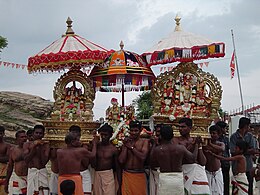
Utsava (Sanskrit: उत्सव, lit. 'special occasion'),[1] also referred to as Utsavam, generally means a festival or celebration or any joyous occasion, mostly associated with Hinduism.[2][3] It also carries the meaning of delight, merriment and pleasure.[4] The Sanskrit word utsava comes from the word "ut" meaning "removal" and "sava" which means "worldly sorrows" or "grief".[5] According to Hindu tradition, utsava are specific to festivals associated with temples.
According to the Agamas, the daily rituals are called Nityotsava, weekly festivals as Varotsava, monthly as Masotsava, alignment with stars as rkotsava and annual festivals as Mahotsava or Brahmotsava. Most of the temple towns in South India have prakarams and streets that accommodate an elaborate festival calendar in which dramatic processions circumambulate the shrines at varying distances from the centre. The temple chariots used in processions are progressively larger in size based on the size of the concentric streets.
- ^ www.wisdomlib.org (5 May 2018). "Utsava: 17 definitions". www.wisdomlib.org. Retrieved 17 August 2022.
- ^ "Utsava". Sanskrit Dictionary. Retrieved 26 January 2022.
- ^ "Utsava - Lets celebrate life". Utsava.com. Retrieved 26 January 2022.
- ^ nathdwara.in
- ^ "Sri Venkateswara Swami Temple of Greater Chicago". Venkatestwara temple of Greater Chicago. Retrieved 26 January 2022.